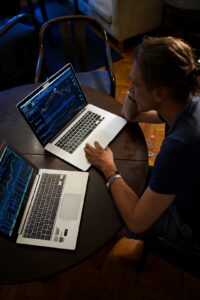In the world of forex trading, staying ahead of global events is crucial to success. The forex market is highly influenced by various global events, including economic indicators, political events, and natural disasters. Traders who can anticipate and react to these events have a significant advantage over their competitors.
To stay ahead of global events in forex trading, it is essential to have a solid understanding of the factors that influence market movements. Economic indicators, such as GDP, inflation rates, and employment data, can have a significant impact on currency valuations. By keeping track of these indicators and understanding their significance, traders can make informed decisions about their trades.
Political events also play a vital role in forex trading. Elections, government policy changes, and geopolitical tensions can all impact currency valuations. For example, when the United Kingdom voted to leave the European Union in 2016, the British pound experienced a significant drop in value. Traders who were aware of this event and positioned themselves accordingly were able to profit from the market volatility.
Natural disasters can also have a significant impact on forex trading. Disruptions in the supply chain, damage to infrastructure, and changes in consumer behavior can all affect currency valuations. For example, when a major earthquake struck Japan in 2011, the Japanese yen experienced a sharp decline in value. Traders who anticipated this event were able to profit by shorting the yen.
So, how can traders stay ahead of these global events and take advantage of market movements? Here are a few strategies:
1. Stay informed: Stay up-to-date with the latest news and developments in the global economy. Subscribe to reputable financial news outlets, follow influential economists and analysts on social media, and join forex trading communities where you can discuss and share information.
2. Economic calendar: Use an economic calendar to keep track of upcoming economic events and indicators. This will help you anticipate market movements and plan your trades accordingly. Make sure to pay attention to high-impact events, such as central bank interest rate decisions and employment reports.
3. Technical analysis: Combine fundamental analysis with technical analysis to get a comprehensive understanding of market trends. Technical analysis involves analyzing historical price data and using various indicators and chart patterns to predict future price movements. By identifying key support and resistance levels, trendlines, and other technical indicators, you can make more informed trading decisions.
4. Risk management: Always have a risk management strategy in place to protect your capital. This includes setting stop-loss orders to limit potential losses and using proper position sizing techniques. Don’t let emotions dictate your trading decisions and avoid taking unnecessary risks.
5. Backtesting and demo trading: Before implementing a trading strategy, backtest it using historical data. This will help you assess its profitability and suitability for different market conditions. Additionally, practice trading with a demo account to gain experience and refine your strategy without risking real money.
6. Follow market sentiment: Pay attention to market sentiment and trader behavior. This can be done by monitoring social media platforms, financial forums, and sentiment indicators. Understanding market sentiment can help you anticipate sudden shifts in market direction.
Staying ahead of global events in forex trading requires continuous learning, adaptability, and a disciplined approach. By staying informed, using a combination of fundamental and technical analysis, managing risks effectively, and practicing with a demo account, traders can increase their chances of success in the ever-changing forex market.






